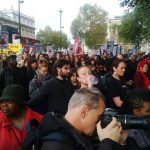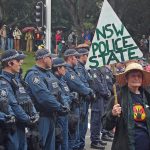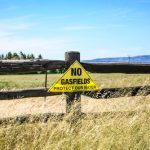Silencing Dissent: NSW Government Gives Itself New Powers to Ban Gatherings

A new Act governing the management of Crown lands, along with a fresh set of regulations, comes into effect on 1 July 2018. And the NSW government has taken this opportunity to continue restrictions on protests and demonstrations in these areas, and increase the penalties that apply.
Crown estate is land owned by the NSW government. It accounts for more than 40 percent of all the land in the state. It includes town squares, parks, roads, beaches and community halls. Famous examples of Crown land are Hyde Park and Bondi Beach.
The Crown Land Management Regulation 2018 (the Regulation) was tabled on 10 April. Most of its provisions begin to apply on 1 July. And amongst them, are a list of activities that can be prohibited, which includes “taking part in any gathering, meeting or assembly,” except at cemeteries.
The management legislation that comes into play on the same day is the Crown Land Management Act 2016 (the Act). It provides police, local council officials and state government employees with the power to direct individuals to refrain from conducting activities prescribed in the regulations.
Critics of the decision to include these powers in the long awaited overhaul of Crown lands, see it as part of a legislative pattern by the Liberal National government to incrementally silence the voice of dissent in this state.
Criminalising protest
Mr Shoebridge moved a motion in parliament last Wednesday to disallow the inclusion of the provisions giving police and officials the power to ban protests, and indeed, most public gatherings on Crown lands. However, the state government prevented the debate from going ahead.
“This government has consistently attacked the right to protest and now they won’t even let parliament debate the issue,” Mr Shoebridge told Sydney Criminal Lawyers®. “NSW is moving closer and closer to a police state.”
In a submission regarding the drafting of the Regulation last year, Mr Shoebridge recommended that the ability to ban taking part in public gatherings, meetings or assemblies, along the power to prevent the displaying of signs or circulation of printed materials on Crown land, be removed.
“There is no doubt that these powers will be abused and will shut down protest,” the Greens justice spokesperson continued. “They are designed to increase police powers and whittle away civil liberties.”
Silencing the public
Similar measures were taken last year, when the Berejiklian government became “uncomfortable” about the growing Martin Place homeless camp. While the camp wasn’t a demonstration, it certainly made a loud statement about homelessness in Sydney right on parliament’s doorstep.
The state government responded by rushing through the Sydney Public Reserves (Public Safety) Act 2017 last August, which provided NSW police with enhanced move on powers, so they can remove people and their items from Crown land within the City of Sydney local government area.
In March 2016, the Liberal National government also passed the draconian Inclosed Lands, Crimes and Law Enforcement Legislation Amendment (Interference) Bill 2016. It created the new offence of aggravated unlawful entry on inclosed lands, which can land a protester with a fine of up to $5,500.
The legislation also provided police with additional powers to stop, search, detain, and seize the property of protesters, as well as being given the power to shut down a peaceful protest if it is obstructing traffic.
The passing of these laws marked the government’s tough new anti-protest stance, which then NSW premier Mike Baird had already implied was coming in 2014, when he promised a NSW mining industry dinner that his government was going to “crackdown” on protesters who break the law.
The powers to prevent
In 2012, the NSW state government initiated a Crown land management review, which reported back that the system needed to be streamlined. And this lead to the passing of the Crown Land Management Act in 2016.
Under section 9.4 of the Act, an authorised officer may direct an individual to stop an activity from being carried out on Crown land if it is one of the prescribed activities listed in the Regulation. An authorised officer can include police officers, state government employees and local council officers.
Section 9.5 of the Act stipulates that the minister for lands and forestry may order “a notice to be displayed in a conspicuous space” that prohibits individuals from carrying out prescribed activities on Crown lands.
There are similar provisions to these in the current legislation, the Crown Lands Act 1989, which is about to be repealed. However, NSW Council for Civil Liberties (NSWCCL) president Stephen Blanks points out that the penalties for failing to comply with a direction have significantly increased.
The Act specifies that the maximum penalty for failing to comply with both these types orders can be set at up to $11,000. Although, the Regulation specifies that a penalty notice for failing to comply with a direction will be $1,100 and one for failing to comply with a notice will be $220.
Under the current legislation, the maximum penalty for any of these offences is $220. And there is no measure within this legislation that allows for a dramatic increase in the fines that apply to penalty notices, as the new legislation does.
Reclaiming our rights
The new regulations “grant sweeping powers that can be used oppressively,” Mr Blanks made clear in his statement. “Any power to ban activities like leafleting and public gatherings on public land is a power that is inconsistent with fundamental civil liberties.”
In response to his initial criticisms, the NSW government argued that the new regulations are much the same as the previous ones. But, Mr Blanks countered that “regulations which are potentially extremely broad in scope, do not become good law simply because they have precedent.”
And like Mr Shoebridge, the NSWCCL president sees these regulations as part of the Liberal National government’s “increased hostility to protest rights,” which was demonstrated with the passing of the 2016 anti-protest laws and the legislation to move on the Martin Place homeless camp.
As for Mr Shoebridge, he stated that “when Parliament goes back in August, we’ll be on the street protesting and inside moving to strip this law from the statute books.” The Greens MLC is set to host the Defend Your Right to Protest rally outside of NSW parliament on 15 August.








